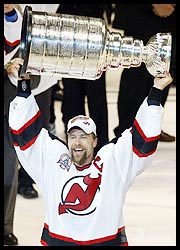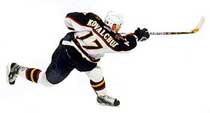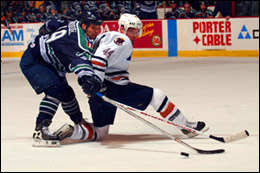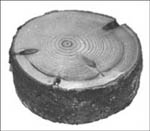| (insert your NIE or newspaper logo here) |
Weekly Online LessonOnline Lesson ArchiveGrade Level: 6-12
|
Devils Crowned Ice Hockey Kings
 Last week, the New Jersey Devils slammed the Anaheim Mighty Ducks to win ice hockey's most coveted prize, the Stanley Cup.
Last week, the New Jersey Devils slammed the Anaheim Mighty Ducks to win ice hockey's most coveted prize, the Stanley Cup.
With a 3-3 game tie going into Game 7 of the National Hockey League (NHL) playoffs, the Devils had the home-ice advantage. When the final buzzer sounded, the Devils had scored 3, the Mighty Ducks 0. Their June 9, 2003 win makes it the Devils' third Stanley Cup in nine seasons.
While the NHL is the oldest professional ice hockey league, it certainly isn't the only one. Other leagues include the American Hockey League (AHL), the North American Hockey League, and the United Hockey League. Although they all finished their seasons as of June 12, fans are still buzzing over the outcomes and talking about how the teams may shape up for next year's face-offs.
So while the puck's still hot, this week you're going to get on the ice and catch the excitement of hockey. You'll learn about the rules of the game, as well as it's long history as a fast-paced, hard-hitting sport.
Rookie Training
 Start your training at How Hockey Works, and read the introduction to this 128-year-old sport. Then gear up for Hockey Basics. How big is the playing field and how is the playing time divided? Exactly how does a period begin? Why is the red line painted differently from the blue lines?
Start your training at How Hockey Works, and read the introduction to this 128-year-old sport. Then gear up for Hockey Basics. How big is the playing field and how is the playing time divided? Exactly how does a period begin? Why is the red line painted differently from the blue lines?
Next read about Penalties. What are some reasons a referee might throw a player into the penalty box? For how long is the player out of the game? How does a penalized player affect the rest of the team?
 Make sure to also familiarize yourself with More Rules: Odds and Ends, as well as the Hockey Gear. Why would a team pull their goalie? Do you know of any other sports that have something similar to hockey's penalty shot? In what ways, and for what reasons, did hockey gear develop?
Make sure to also familiarize yourself with More Rules: Odds and Ends, as well as the Hockey Gear. Why would a team pull their goalie? Do you know of any other sports that have something similar to hockey's penalty shot? In what ways, and for what reasons, did hockey gear develop?
Now you get to learn about the Hockey Season and the NHL's Stanley Cup. So how are the teams divided and the playoffs scheduled? Where did the original Stanley Cup come from? Where does the trophy go after 13 years?
Hockey History
To really know what a sport is about, it's good to know the history of how it developed. The best place for studying hockey's history is Windsor, Nova Scotia, Canada, the Birthplace of Ice Hockey. Begin by browsing through the Origin of Ice Hockey section to read the various historical accounts of how the game spread from place to place. What kinds of evidence exists that points to Nova Scotia as ice hockey's native home?
 That's where and when the sport was born, but that's certainly not exactly the game that's played today. To look at how hockey got where it's at, check out the Evolution of Hockey. After reading the Overview, browse the sections on Stick-Ball Games, Equipment, Team, Rules and the Glossary. You can find out more about each topic by clicking on the thumbnail photos and the underlined links.
That's where and when the sport was born, but that's certainly not exactly the game that's played today. To look at how hockey got where it's at, check out the Evolution of Hockey. After reading the Overview, browse the sections on Stick-Ball Games, Equipment, Team, Rules and the Glossary. You can find out more about each topic by clicking on the thumbnail photos and the underlined links.
How did other games influence the evolution of ice hockey — from its rules to its equipment? From what parts of the world did those earlier games migrate to Canada?
To round out the historical perspective, also read the NHL's History page. When and where did the first professional ice hockey league form? When was the NHL created?
Newspaper Activities
Look through current issues of Targetnewspaper, especially the sports section. Are there any follow-up stories about this year's winning teams? What about those that didn't do so well this season? Any players getting traded, coaches changing teams, or other news related to the NHL, AHL or other hockey leagues? Also, look for news on sports that share some similarities with ice hockey, like gear or rules. What exactly are these similarities and what are the characteristics that make the sports different from each other?
© Copyright 2002
Learners Online, Inc.
